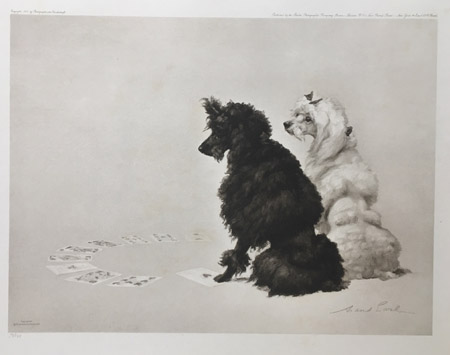
Toy Poodle
|
|
This breed was highly prized for centuries before it were brought to England. In Europe in the 18th century, the Toy Poodle, the newest of the three Poodle varieties (Standard, Miniature and Toy), was called the White Cuban or Havana Dog, and was considered to be a sleeve dog and favorite pet. Queen Anne, who owned several Toy Poodles in her later years, had admired them in 1700 when a troupe of performing Poodles, known as the "Ball of Little Dogs," came to Great Britain. These performing dogs were exceptionally well trained and it is recorded that they danced to music in an almost human fashion. Through the centuries, Poodles have always been trimmed for hygienic and occupational reasons the Standard Poodle was bred as a gundog and water retriever, and the characteristic trim was intended to protect the dog both in and out of the water. Even though the breed did not originate in France, the flair of the French came to the fore when it became the custom to trim them in more exaggerated styles. During the reign of Louis XVI (1774-92), the art of trimming Poodles became extremely decorative. Dog barbers cut coats of arms, lovers knots, monograms, and fleurs-de-lis in the dogs hair and ornamented them with mustaches and small pointed beards known as imperials, or high pompadours similar to those worn by ladies of the royal court. The Toy Poodle was known in Germany as early as the fifteenth and sixteenth centuries and in England and Spain by at least the eighteenth century. The breed had many loyal and devoted followers. Mrs. Claude Hay of London, for instance, one of the members of The Ladies Kennel Association, wrote: "Words can never express what our doggies are to myself and my husband -- I think were it a case of one meal only to be got, the doggies would have it. They are consulted in everything, and always give an answer, sometimes the wag of a tail or a forlorn look, this mostly when friends, not lovers of dogs, have sent them no invitation to accompany 'Father and Mother.'" |
Home | About
the WS Gallery | Current
Exhibition | New
Additions | Search Our Inventory
| Commissioning Paintings | 19th
& 20th Century Oils | Contemporary
Artists | Works
on Paper & Collectibles | Books
| Christine Merrill
| Guest book | Email
Us
All images, designs and information on this site
are fully copyrighted © 1999
and may not be reproduced of used in any form or any manner, or displayed in
any way
on any website without the express written consent of The William Secord Gallery,
Inc.
William Secord Gallery, Inc.
29 West 15th Street 4th floor
New York, NY 10011
Between Fifth and Six Avenues
www.dogpainting.com
wsecord@dogpainting.com
Tel. 212-249-0075
212-249-0896
By appointment
